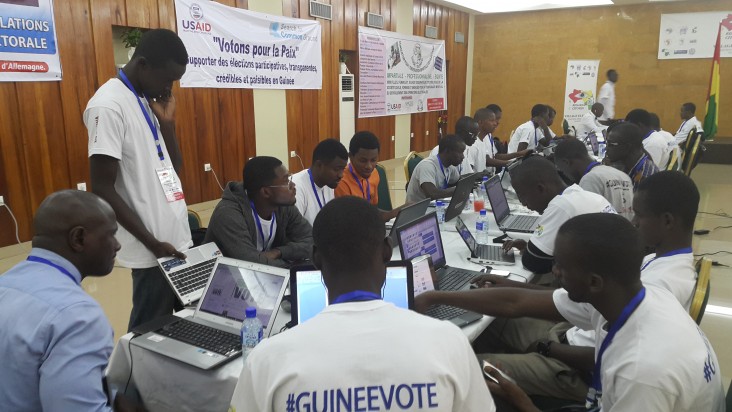
February 2016—Transitions from authoritarian rule to multiparty democracy are often contentious, rocky affairs. But public radio and an organized dose of openness helped Guinea avert violence in 2015 that marred its 2010 election.
Lack of information can quickly spawn destructive rumors and misinformation that fuels conflict. Last October, USAID’s Radio Synergy program trained and deployed more than a 130 journalists in all 33 Guinean prefectures to support communications for the National Independent Electoral Commission.
The program, based on the idea that social-political tension can be averted when information is freely and widely available, was implemented by the NGO Search for Common Ground.
“Elections correspond to periods of rising tensions and occasional political violence,” said Aissata Camara, a journalist who worked for the Radio Synergy program in the prefecture of Dabola. “Our role is particularly crucial during the election process. I want to thank USAID for giving me the opportunity to deliver thorough, verified and unbiased information, and promote social cohesion in our country.”
The Radio Synergy program provided civic and voter education encouraging participation and acceptance of the results. Newscasts disseminated messages tailored to local audiences across the country on peace and restraint. Information was also provided on how to file complaints and contest election results through proper authorities as well as other fact-based material related to the Oct. 11 presidential election.
Throughout the country, Radio Synergy reports were broadcast comprehensively through both public and private media outlets. Programs continued from 6:30 a.m. to 12:00 a.m. simultaneously on 69 different radio stations, including 29 public and 40 private stations, over a three-day period.
The project included 59 newscasts as well as magazines, interviews, musical segments, and sketches. The Radio Synergy program also established a “Situation Room” that received frequent reports from more than 6,000 domestic election observers—reports that were shared with the wider public.
Radio Synergy’s broadcasts reached an estimated 60 percent of Guinean citizens, or about 3 million people of voting age.
The outcome and impact led to a 2015 presidential election with minimal violence and high voter turnout, while voters displayed enthusiasm and patience as they waited to cast their ballots. In a survey, 75 percent reported regularly hearing or watching at least two of the project activities.
With a history of voting along ethnic and regional lines, the citizens of Guinea were provided with balanced and professional election coverage. This milestone in Guinea’s progress toward participatory democracy and good governance is just one reason to celebrate World Radio Day on Feb. 13, 2016.
Radio Synergy is part of a larger USAID program to foster reconciliation, conflict resolution and social peace in Guinea which runs from September 2014 to March 2016.
LINKS
Follow @USAIDGuinea, on Facebook, on Flickr







Comment
Make a general inquiry or suggest an improvement.